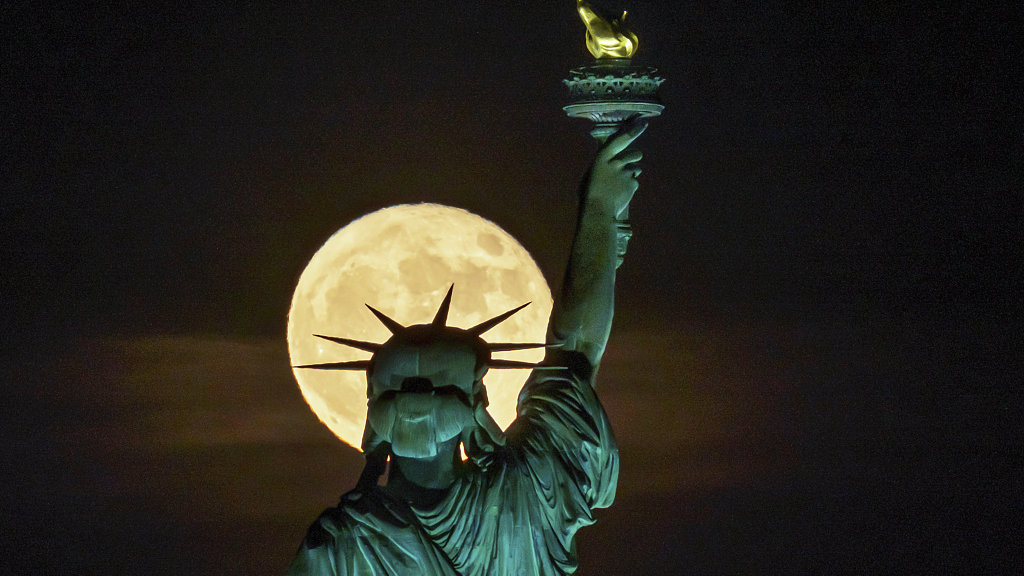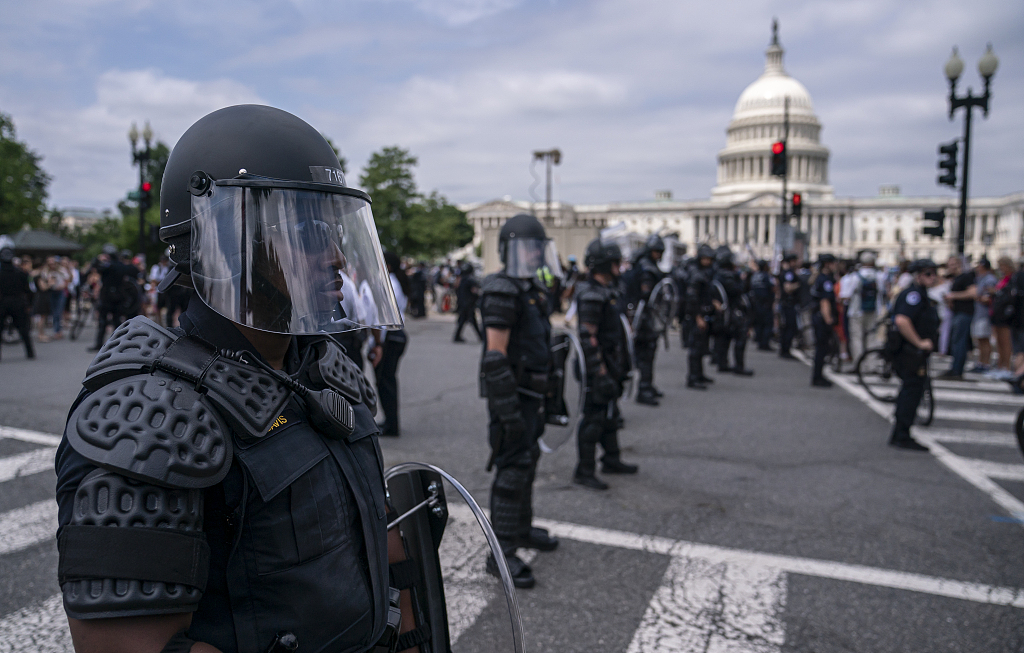
The Strawberry Supermoon rises in front of the Statue of Liberty in New York, June 14, 2022. /VCG
The Strawberry Supermoon rises in front of the Statue of Liberty in New York, June 14, 2022. /VCG
Editor's note: Bradley Blankenship is a Prague-based American journalist, political analyst and freelance reporter. The article reflects the author's opinions and not necessarily the views of CGTN.
With U.S. Independence Day upon us once again this July 4, the current political climate in the country leaves many to wonder if Americans have anything to be proud of nearly 250 years after the establishment of their country. A recently updated compilation of data by the Pew Research Center on Americans' perception of their country and democracy indicates that there may not actually be much.
One survey from July 2021 found that 52 percent of respondees said the U.S. is "one of the greatest countries in the world, along with some others," and another 23 percent said the country "stands above all other countries in the world," which is the lowest value recorded to date. Almost a quarter of respondees said that "there are other countries that are better than the U.S."
There were, of course, some differences by age and party. People over 65 were most likely to say the U.S. is better than all other countries (38 percent), while people aged 18 to 29 were the least likely to feel the same (10 percent). Republicans and right-leaning independents felt stronger (38 percent) that the U.S. is better than all other countries while just 12 percent of Democrats and left-leaning independents agreed. A majority (55 percent) of Democrats in the age range 18 to 29 agreed that other countries are better than the U.S.
Other surveys conducted by Pew this year and over the past several years indicate that around two-thirds of Americans believe that their country is less-respected on the international stage and that about the same number see the country's openness to the world as "essential." Pew surveys also found that nearly six in 10 are upset with how their country's democracy functions but that, according to a spring 2022 survey, about two-thirds remain optimistic about the future.

Capitol Police dressed in riot gear watch as activists react to the Supreme Court's ruling in the Dobbs v Jackson Women's Health Organization case in front of the U.S. Supreme Court in Washington, D.C., June 24, 2022. /VCG
Capitol Police dressed in riot gear watch as activists react to the Supreme Court's ruling in the Dobbs v Jackson Women's Health Organization case in front of the U.S. Supreme Court in Washington, D.C., June 24, 2022. /VCG
I believe that this latest data point can be chalked up to some form of America's well-known dynamism. Despite all indications that things are headed for disaster, I believe the general American will still cling to hope regardless. It is deeply embedded in the cultural psyche to believe the "good guys" will always win in the end, for better or worse.
Personally, I am not one of these people. I am not optimistic about the future of the United States, which is why I don't live there. I fall comfortably into the left-leaning, 18-29 demographic – which is also why I am more inclined to not believe that America is better than any other country and feel that other countries might even be better. This has to do, largely, with my lived experience.
Let me give an example to illustrate why I personally feel this way. Just a few days ago, I went to get an eye exam and purchase some contact lenses. My exam was free and I was billed for roughly $80 for a year's supply in contact lenses. I live in the Czech Republic. My sister, a student in the U.S., also visited the optometrist. She's on Medicaid, a subsidized health insurance program for low-income earners, but was quoted $550 for a year's supply in contact lenses and had to pay for her exam.
Think about that. My sister makes such little money in the U.S. that she actually has government-subsidized health insurance, but apparently, that doesn't apply to her ability to see. So she's charged nearly seven times as much for contact lenses as what I paid. That is absolutely outrageous.
Going down the list of ordinary living expenses, my sister's life in the U.S. (no offense to her) seems like some kind of dystopian mirror image of mine. She's paying hundreds per month for a car she needs for day-to-day life, meanwhile, Prague has one of the greatest public transportation systems in Europe that costs me a few hundred bucks per year. Then she has to pay for insurance for that car, plus fuel. She does have government health insurance but her access to it is spotty at best. And as I said before, she's a student, which is running her into serious debt.
It seems that each of these problems do not exist in other OECD countries. A growing number of Americans, particularly young Americans, are starting to realize that the grass is indeed greener on the other side – which is why so many are leaving and why, according to a June survey by Greenback Expat Tax Services, one in four expats is "seriously considering" or "planning" to renounce their citizenship.
American exceptionalism is in sharp decline, and it's not due to some foreign-operated propaganda barrage or some other form of indoctrination. It is due to the experience of living in the United States. Expect this number to continue to grow so long as the country doesn't get its house in order by joining the rest of the world in supporting its citizens.
(If you want to contribute and have specific expertise, please contact us at opinions@cgtn.com. Follow @thouse_opinions on Twitter to discover the latest commentaries on CGTN Opinion Section.)

